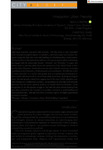Introduction: Urban Precarity
| dc.contributor.author | Campbell, Brian | |
| dc.contributor.author | Laheij, C | |
| dc.date.accessioned | 2022-01-14T10:31:16Z | |
| dc.date.available | 2022-01-14T10:31:16Z | |
| dc.date.issued | 2021-09-26 | |
| dc.identifier.issn | 0893-0465 | |
| dc.identifier.issn | 1548-744X | |
| dc.identifier.uri | http://hdl.handle.net/10026.1/18555 | |
| dc.description.abstract |
<jats:title>Abstract</jats:title><jats:p>Cities have long been associated with precarity. This link seems to have intensified under contemporary global regimes of capitalism, with both popular and academic discourses noting the risks that come with building and inhabiting urban environments. The introduction to this special issue reflects on the various ways in which anthropology has engaged with the relationship between “urbanity” and “precarity.” It argues that current work on precarity either favors the experiences of the Global North or sidelines the urban dimension. Studies that overcome these obstacles, moreover, are largely crystalizing around discussions of infrastructure and securitization. We offer the notion of “urban precarity” as a call for ethnography that cross‐germinates developments in urban studies with those made in our understanding of precarity. By foregrounding the urban, the ethnography collated here suggests that in the cities of late capitalism, precarity emerges as a multifaceted condition, encapsulating not only legal and economic deprivation but also moral, spiritual, political, and health‐related uncertainties. As the protagonists of our ethnography struggle to deal with the many threats bearing down upon them, precarity is also revealed as a condition conducive to world‐building and social transformation, although such forms of creative agency are highly experimental and liable to backfire.</jats:p> | |
| dc.format.extent | 283-302 | |
| dc.language | en | |
| dc.language.iso | en | |
| dc.publisher | Wiley | |
| dc.title | Introduction: Urban Precarity | |
| dc.type | journal-article | |
| dc.type | Conference Proceeding | |
| plymouth.issue | 2 | |
| plymouth.volume | 33 | |
| plymouth.publication-status | Published | |
| plymouth.journal | City and Society | |
| dc.identifier.doi | 10.1111/ciso.12402 | |
| plymouth.organisational-group | /Plymouth | |
| plymouth.organisational-group | /Plymouth/Faculty of Arts, Humanities and Business | |
| plymouth.organisational-group | /Plymouth/Faculty of Arts, Humanities and Business/School of Society and Culture | |
| plymouth.organisational-group | /Plymouth/REF 2021 Researchers by UoA | |
| plymouth.organisational-group | /Plymouth/REF 2021 Researchers by UoA/UoA20 Social Work and Social Policy | |
| plymouth.organisational-group | /Plymouth/Users by role | |
| plymouth.organisational-group | /Plymouth/Users by role/Academics | |
| dcterms.dateAccepted | 2021-06-08 | |
| dc.rights.embargodate | 2022-1-15 | |
| dc.identifier.eissn | 1548-744X | |
| dc.rights.embargoperiod | Not known | |
| rioxxterms.versionofrecord | 10.1111/ciso.12402 | |
| rioxxterms.licenseref.uri | http://www.rioxx.net/licenses/all-rights-reserved | |
| rioxxterms.licenseref.startdate | 2021-09-26 | |
| rioxxterms.type | Journal Article/Review |


